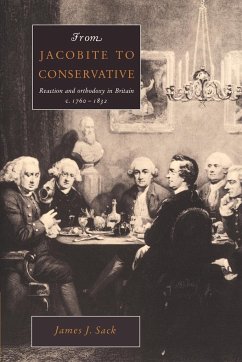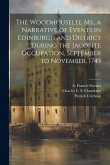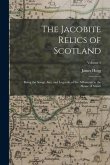What did it mean to be a 'conservative' in Britain before such terminology was even used? Is it possible or even desirable to encapsulate such diverse individuals as George III, Samuel Johnson, Edmund Burke, J. W. Croker and the Young Pitt within one political nomenclature? What is the relationship between the Jacobitism or Toryism of the early eighteenth century and the ideology of loyalist Englishmen of the latter Georgian period? James Sack confronts these questions in discussing an evolving right-wing mentalité, expressed in attitudes towards the past, the monarchy, humanitarianism, reform, and religion. Although Professor Sack has consulted a wide range of unpublished and printed correspondence, pamphlets, and sermons, his chief sources have been numerous 'Church and King' newspapers, journals, and magazines. From this right-wing press, Sack has uncovered a novel way of looking at political, social, and religious issues in the age of the American, French, and Industrial Revolutions. His central contention is that the defence of the Church of England, rather than nationalistic impulses, monarchical sentiment, or even economic self-interest, was the abiding concern of pre-1832 British conservatism.
Table of contents:
Acknowledgments; List of abbreviations; Introduction; 1. The right-wing press from Jacobitism to the Reform crisis: a discussion of sources; 2. The spirit of the English Right in an age of revolution; 3. Tories and Jacobites in the mid and late eighteenth century; 4. Toryism redivivus; 5. The British monarchy and the Right, 1760-1832; 6. Parliamentary reform and the Right, 1750-1832; 7. Tory humanitarianism and political economy, 1760-1832; 8. The right and Protestantism; 9. The Right and Catholicism; Conclusion; Select bibliography; Index.
What would it mean to be 'conservative' in Britain before such terminology was even used? What is the relationship between the Jacobitism or Toryism of the early eighteenth century and the ideology of loyalist Englishmen of the latter Georgian period. James Sack confront these questions in discussing an evolving right-wing mentalité.
Hinweis: Dieser Artikel kann nur an eine deutsche Lieferadresse ausgeliefert werden.
Table of contents:
Acknowledgments; List of abbreviations; Introduction; 1. The right-wing press from Jacobitism to the Reform crisis: a discussion of sources; 2. The spirit of the English Right in an age of revolution; 3. Tories and Jacobites in the mid and late eighteenth century; 4. Toryism redivivus; 5. The British monarchy and the Right, 1760-1832; 6. Parliamentary reform and the Right, 1750-1832; 7. Tory humanitarianism and political economy, 1760-1832; 8. The right and Protestantism; 9. The Right and Catholicism; Conclusion; Select bibliography; Index.
What would it mean to be 'conservative' in Britain before such terminology was even used? What is the relationship between the Jacobitism or Toryism of the early eighteenth century and the ideology of loyalist Englishmen of the latter Georgian period. James Sack confront these questions in discussing an evolving right-wing mentalité.
Hinweis: Dieser Artikel kann nur an eine deutsche Lieferadresse ausgeliefert werden.





![The History of the Williamite and Jacobite Wars in Ireland; From Their Origin to the Capture of Athlone. [With Plates and Maps.] - War College Series The History of the Williamite and Jacobite Wars in Ireland; From Their Origin to the Capture of Athlone. [With Plates and Maps.] - War College Series](https://bilder.buecher.de/produkte/57/57827/57827654m.jpg)


